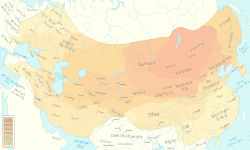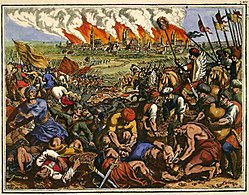World History/Changes in Eurasia - Mongol Conquest and Aftermath
Maps | Resources | Contributors' Corner
Mongol Conquest
[edit | edit source]
As Europe lived through its High Middle Ages, the largest empire the world had yet seen emerged in Asia. In the early 1200's, a chief called Chingis Khan (formerly spelled "Ghengis," from the Persian) unified the Mongols with other nomadic steppe tribes. The unified Mongols were called the Golden Horde. Chingis (meaning "oceanic;" before his coronation his name was Temujin) had numerous skillfull generals, the most noted of them being Subutei Bagatur and Jebe Bagatur (no relation, Bagatur in Mongolian simply means 'brave'. The names of all Mongol generals and leaders have multiple spellings).
Russian Conquest
[edit | edit source]In the year 1240, the Mongols invaded the Slavic people of Russia. The Mongols imposed taxes on the kings but let the kings rule. In the year 1480, Ivan the Great ended Mongolian dominance after the Standoff on the Ugra river.
Asian Conquest
[edit | edit source]
By 1260, the armies of Mongol Empire had swept with overwhelming force out of the Asian steppes, utterly destroyed ancient and powerful kingdoms in the Middle East, and reached as far west as Egypt and Poland before halting their advance. During the same period, Mongol assaults on China wore down the Sung dynasty and let them establish the Da Yuan ("Great Beginning") dynasty. The Mongols' military tactics, based on the swift and ferocious use of mounted cavalry, crushed even the strongest European and Islamic forces that took the field against them. They also learned primitive cannon and firearm technologies and brought them to the West.
Despite two attempted ambitious amphibious invasions, Mongol attempts to invade Japan failed.[1]
Aftermath of the Conquest
[edit | edit source]
The Mongol Empire would become the largest empire at its peak, stretching from China as far as Russia. Mongol rule in these areas integrated them from the rest of the world, and stimulated trade between Europe and Asia. This would have profound effects that would continue many centuries after the disintegration of the empire (which was caused by the need for different styles or government in different areas, and war between Chingis' successors), including stimulating Europeans to explore the world looking for Asia's riches.
References
[edit | edit source]- ↑ "Asian Topics on Asia for Educators || Medieval Japan". afe.easia.columbia.edu. Retrieved 21 January 2024.
